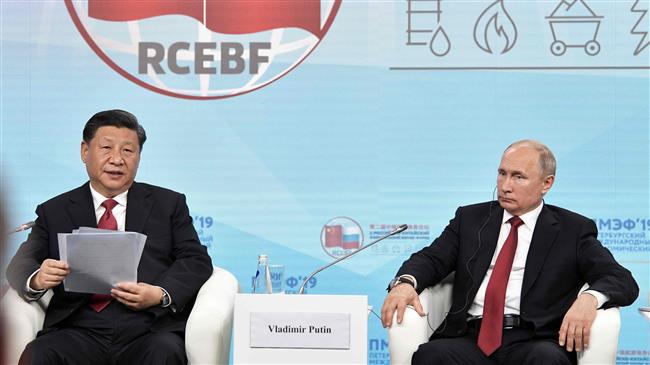Trump carving out political space for China deal: Don DeBar
US President Donald Trump is essentially carving out political space to reach agreements with China that would otherwise not be politically viable domestically, according to American journalist and political commentator Don DeBar.
Remember his over-the-top language regarding the North Korean leader, whom he now refers to as “his best friend.” If he hadn't done the overt hostility first, he would have been accused of being “soft” on North Korea. But instead he went full nut job first and then had plenty of room to do pretty much whatever he wanted, the journalist stated.
DeBar made the remarks in an interview with Press TV on Tuesday while commenting on a statement by Trump about China.
Trump on Monday said the US central bank has put him at a disadvantage in the trade war with Beijing but despite that "China is getting absolutely decimated" by his actions.
In an interview with CNBC on Monday, Trump said the Federal Reserve System, informally known as the Fed, has been "very, very destructive" to the US economy.
He lamented that Chinese President Xi Jinping can issued directions to their central bank and make up for the impact of the tariffs imposed by the US president on Chinese goods.
DeBar said, “It is important to keep in mind the difference between the apparent and the essential, or between appearance and reality. Trump, like the media in the US generally, has a consistent narrative that is not necessarily baselined to reality, at least in a direct way - like the media in the US. The media has its own story and we find out later that very often a lot of it was not factually correct.”
“Trump here is making statements about the situation between the US and China, that are intended to satisfy a sort of bloodlust against China that exists in the rightwing and the neocon universe, and this is something has been nurtured since the Chinese revolution, really, in the late '40s,” the analyst said.
“So by doing this, getting over the top with China, he, in essence, is creating a political condition where then he is allowed to reach whatever kind of the agreement he would like, within reason, and without being subject to attacks from the right, from the neocons, that he has been ‘soft on China',” he explained.
“This is something that we have seen foreshadowed in the way he has dealt with the DPRK, with North Korea, when he was over the top in his criticism of the North Korean leader and established credentials basically as, you know, the guy who is the hardest on North Korea of all the presidents going back to 1952,” he added.
“Well now, a year and half later he is now calling the same guy his best friend. This is how he carves out political space to have freedom of action in the place where, you know, the elites have not allowed that kind of freedom of action for presidents, members of Congress and other officials for a very long time,” he said.
“I would say Iran's the same, although we haven’t seen it come to fruition yet, with the way he spoke rhetorically in dealing with Iran, abrogating the agreement that never had been really fulfilled - sanctions were never really fully rolled back, and the United States under Obama never really fulfilled that agreement either, but the rhetorical treatment of Iran has been brutal,” DeBar said.
“And so now if he would turn around and reach an alliance with Iran - to go into Syria, for example, to help clean up the problems that have been created there - he has the complete freedom of motion to do that, because he has been perceived already as being tough on Iran and would not be vulnerable to attacks that he had been ‘soft’ on Iran,” he observed.
“So I think when we look at the situation in China, we've got to look at it at the same context,” he concluded.
Magnetic revolution: Iran’s nano-solutions driving cleaner and greener oil industry
Deadly clashes erupt in Syria’s Aleppo as US-backed SDF forces defy HTS rule
FM Araghchi: Iran’s internal affairs solely matter of its people
Iran army chief: Enemy threats will not go unanswered
Iran: Israeli FM’s visit to Somaliland a ‘dangerous precedent’
Rome protests Maduro abduction by US
Leader of Yemen’s separatists flees ahead of talks in Saudi Arabia
Venezuela to deliver 30-50 million barrels of oil to US: Trump
















 This makes it easy to access the Press TV website
This makes it easy to access the Press TV website